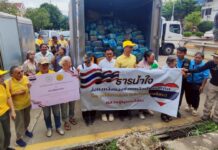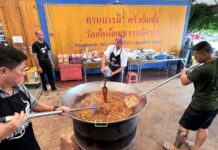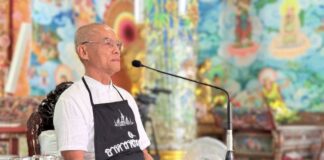ขออนุญาตแสดงความเห็นต่างนะจ๊ะ
๒๕ กันยายน ๒๕๖๗
จากกรณีที่มีภิกษุรูปหนึ่งได้แสดงทัศนคติของตนเองที่เกี่ยวกับการุณยฆาตว่าไม่ผิด ไม่บาป การทำการุณยฆาต คือ การร่วมมือกับธรรมชาติ
ความคิดแบบนี้ คำพูดเช่นนี้ หากเป็นฆราวาสพูดก็ดูไม่กะไร แต่หากเป็นคำพูดของคนโกนหัว ห่มเหลือง แล้วประกาศตนเองว่า เป็นภิกษุที่น้อมนำเอาพระธรรมวินัยขององค์พระบรมศาสดาอรหันตสัมมาสัมพุทธเจ้ามาปฏิบัติ ทั้งยังมีหน้าที่สั่งสอนอบรมผู้คนให้ปฏิบัติตามหลักศีล สมาธิ ปัญญาอีกด้วย
มันจะกลายเป็นสอนแต่เขาอิเหนาทำเสียเองไปหละกระมัง
แล้วไอ้ที่เคยพูดเคยสอนเอาไว้ว่า พระองค์บอกว่า อนาคตกาลข้างหน้าจะเกิดธรรมอย่างหนึ่งขึ้นมา เรียกว่า สัทธรรมปฏิรูป
แล้วที่ตนเองสอนอยู่นี่มันไม่เรียกว่า สัทธรรมปฏิรูป ล่ะหรือ ?
ในสายตาของนักสอนศาสนาทั้งโลกเขาจะคิดอย่างไร ไม่รู้ว่าผู้พูดจะกล้าออกมายอมรับไหมว่าตนเองกำลังสอนสัทธรรมปฏิรูป ซึ่งก็ไม่ใช่จะมีเฉพาะการุณยฆาตเท่านั้น แต่ยังมีอีกหลายคำสอนที่ไม่ใช่ธรรม ไม่ใช่วินัย เขาจะรู้ตัวหรือไม่ว่าสิ่งที่ตัวเองพูด ตัวเองสอน มันคือสัทธรรมปฏิรูป หากสิ่งที่ตนเองพูด ตนเองสอน มันผิดไปจากหลักพระธรรมวินัย มันเป็นทองเทียม ไม่ใช่ทองแท้อย่างที่ตนเองเคยพูด แล้วจะรับผิดชอบอย่างไร
ทีนี้ลองมาดูมูลเหตุที่พระพุทธศาสนาต้องอบรมสั่งสอนและปฏิบัติในศีล สมาธิ ปัญญา ก็เพราะว่า ความเชื่อในเรื่องกฎของกรรม
เชื่อว่า เราเป็นผู้มีกรรมเป็นของๆ ตน
เชื่อว่า เราเป็นผู้รับผลของกรรมนั้น
เชื่อว่า เราเป็นผู้มีกรรมเป็นกำเนิด
เชื่อว่า เราเป็นผู้มีกรรมเป็นเผ่าพันธุ์
เชื่อว่า เราเป็นผู้มีกรรมเป็นที่พึ่งอาศัย
เชื่อว่า เราจักทำกรรมอันใดไว้
เชื่อว่า ดีหรือชั่ว
เชื่อว่า เราจักเป็นผู้รับผลของกรรมนั้น
เชื่อว่า สัตว์โลกย่อมเป็นไปตามกรรม กรรมย่อมจำแนกสัตว์ให้ดี ชั่ว เลว หรือ หยาบ
และเชื่อว่า การฆ่าหรือยินดีในการฆ่า หรือการยินยอมให้เขาฆ่า แม้จะเป็นตนเองก็เป็นความผิดบาป
ตัวอย่างเช่น
พระผู้มีพระภาคเจ้าประทับ ณ เรือนยอด ป่ามหาวัน ใกล้กรุงเวสาลี พระองค์ได้แสดงอสุภกถา คือ ถ้อยคำปรารภสิ่งที่ไม่สวยงาม สรรเสริญคุณแห่งอสุภะ และคุณแห่งการเจริญอสุภะคือ การพิจารณาเห็นร่างกาย โดยความเป็นของไม่สวยงาม กับทั้งคุณแห่งอสุภสมาบัติ (การเข้าฌานมีอสุภะเป็นอารมณ์ โดยปริยายเป็นอันมาก) ครั้นแล้วตรัสว่า ทรงพระประสงค์จะหลีกเร้นอยู่ตามลำพังพระองค์ตลอดกึ่งเดือน ใครๆ ไม่พึงเข้าไปเฝ้าเว้น แต่ภิกษุผู้นำอาหารเข้าไปเพียงรูปเดียว
ภิกษุทั้งหลาย ปฏิบัติอสุภภาวนา (การเจริญอสุภกัมมัฏฐาน) คือพิจารณาร่างกายโดยความเป็นของไม่งาม) เกิดความเบื่อหน่าย รังเกียจร่างกายของตนเหมือนชายหนุ่มหญิงสาวที่ชอบการประดับตกแต่ง อาบน้ำ ดำเกล้าแล้ว รังเกียจ ซากศพงู ซากศพสุนัข ซากศพมนุษย์ ซึ่งคล้องอยู่ที่คอฉันนั้น เมื่อเบื่อหน่ายรังเกียจด้วยกายของตนอย่างนี้ ก็ฆ่าตัวตายบ้าง ฆ่ากันเองบ้าง เข้าไปหานายมิคลัณฑิกะคือ ผู้แต่งตัวเหมือนสมณะ จ้างให้ฆ่าตัวเองโดยให้บาตรจีวรเป็นค่าจ้าง โดยนัยนี้นายลัณกัณฑิกะ ก็รับจ้างฆ่าภิกษุทั้งหลายวันละ 1 รูปบ้าง 2 รูปบ้าง 3 รูปบ้าง 15 รูปบ้างจนถึง 60 รูปบ้าง
เมื่อครบกึ่งเดือน พระผู้มีพระภาคเจ้าได้เสด็จกลับจากการหลีกเร้น และทรงทราบเรื่องนั้น จึงเรียกประชุมสงฆ์ทรงสอนอานาปานสติ (คือการทำใจให้ตั้งมั่น โดยกำหนดลมหายใจเข้าออก) โดยปริยายต่างๆ แล้วทรงปรารภเรื่องภิกษุฆ่าตัวตาย ฆ่ากันและกัน รวมถึงจ้างให้ผู้อื่นฆ่าตน ทรงติเตียน แล้วทรงบัญญัติสิกขาบทห้ามมิให้ภิกษุฆ่ามนุษย์ หรือใช้ให้คนอื่นฆ่า) ทรงปรับอาบัติปาราชิกแก่ภิกษุผู้ล่วงละเมิด
ต่อมาได้ทรงบัญญัติเพิ่มเติมห้ามพรรณนาถึงความตาย หรือชักชวนเพื่อให้ตาย ผู้ใดล่วงละเมิดข้อห้ามนี้ต้องอาบัติปาราชิก
(ปาราชิก สิกขาบทที่ ๓ พระไตรปิฎกเล่มที่ ๓ พระวินัยปิฎกเล่มที่ ๓)
เช่นนี้ภิกษุผู้พรรณนาถึงประโยชน์แห่งการุณยฆาตจะต้องเป็นอาบัติปาราชิกไปด้วยหรือเปล่า
เอ้า..พระเดชพระคุณท่านมหาเถระ เจ้าคณะปกครอง และราชบัณฑิตว่าไง หรือจะปล่อยให้เลยตามเลย
พุทธะอิสระ
——————————————–
ลิงค์จาก : https://www.facebook.com/photo/?fbid=906915477967389&set=a.107732901218988
——————————————–
Please let me express different points of view.
September 25, 2024
A monk expressed his opinion that euthanasia is neither wrong nor sinful. Euthanasia is a collaboration with nature.
It does not matter if this view or speech belongs to just a secular.
Nevertheless, this speech belongs to a monk who declared to accept and adhere to the code of monastic discipline and whose duty is to teach people the principles of precepts, concentration, and wisdom. Isn’t it that the pot calls the kettle black?
The Buddha had formerly predicted that false doctrine would occur. Has not this monk realized that what he is teaching is false doctrine?
How would religious teachers worldwide think about this monk’s opinion? Will this monk dare to accept that he is teaching false doctrine? Aside from euthanasia, his other teachings, conflict with Buddhist principles.
Has he realized that what he said and taught is false doctrine? If what he taught is fake gold, not real gold, as he said, how can he be accountable for teaching false doctrine and deviating from monastic discipline?
Buddhism must teach and practice precepts, concentration, and wisdom because it believes in Karma.
The belief that we have our own Karma
The belief that we receive the outcomes of Karma ourselves
The belief that we are born with residual karma from our past lives
The belief that our birth and circumstances in this life are the outcomes of our Karma.
The belief that our being results from our past and present Karma
The belief that whatever Karma we do, good or bad, we will receive the consequences of our own Karma
The belief is that the law of Karma and Karma governs all living creatures and classifies living creatures into good, evil, bad, or rough.
And the belief that killing, pleasure in killing, or hiring someone to kill oneself is sinful.
The Buddha stayed at a pavilion in the Mahawan Forest near Vaishali City. The Buddha preached on the advantage of contemplating human bodies as corpses and disgusting objects. The Buddha preached the advantage of attaining a serene state of mind by contemplating corpses.
Then, the Buddha said he wished to seclude himself for half a month. Visitors were not permitted, except for any monk bringing him food.
Then, monks practiced corpse contemplation and became bored and loathed their bodies. Similar to young men and women who like to dress up and clean their bodies but feel disgusted with the corpses of snakes, dogs, and humans hung around their necks.
Feeling disgusted with their bodies, some monks killed themselves or killed one another. Some monks approached Mikkalunthika, who dressed like a priest. The monks hired Mikkalunthika to kill them in exchange for alms bowls and monk’s robes. In a day, Mikkalunthika killed one monk, two monks, 15 monks, or 60 monks.
After half a month, the Buddha returned from solitude and knew about this. Thus, the Buddha called for a monk meeting and taught them to practice mindfulness in breathing in and breathing out. The Buddha reproved monks’ committing suicide, killing one another, and having someone to kill them. Then, the Buddha set a monastic rule to prohibit monks from killing humans or hiring someone to kill. Violating this rule meant a grave offense, resulting in expulsion from monkhood.
The Buddha later set additional monastic rules, prohibiting monks from describing death or persuading someone to die. Violating this rule meant a grave offense, resulting in expulsion from monkhood (the 3rd grave offense results in expulsion from monkhood, according to the 3rd Tipitaka, the 3rd Vinaya Piṭaka).
As such, aren’t monks who described the benefit of euthanasia deemed to have committed a grave offense?
Well, reverend senior monks, ecclesiastical official monks, and royally appointed Buddhist scholars, what to do or let go?
Buddha Issara
——————————————–
Previous article : https://www.facebook.com/photo/?fbid=906915477967389&set=a.107732901218988







